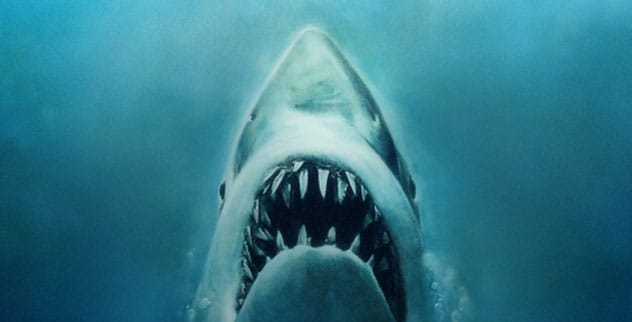Box office bombs and on-set scandals are common filmmaker regrets. But sometimes, even successful directors look back on their iconic movies with a touch of remorse. Whether it’s unintended social consequences or scenes that haven’t aged well, here are ten major filmmakers who have expressed regrets about their most famous films.
Jaws – Steven Spielberg
Steven Spielberg, one of cinema’s greatest storytellers, might have inadvertently changed the world for the worse with Jaws. Released in 1975, the film has been blamed for a drastic decline in the North American shark population, estimated at a staggering 50 percent.
Some experts believe the movie triggered a shark hunting frenzy. Spielberg himself admitted in a 2022 interview that he regrets the film’s impact, partially blaming both the original book and his adaptation. However, the head of the Shark Trust argues that the film’s influence is overstated, and overfishing is the primary cause of the shark decline.
Midnight Express – Oliver Stone
Oliver Stone won an Oscar for writing this 1979 film, but he regrets its over-dramatization. Midnight Express tells the true story of Billy Hayes, an American imprisoned in Turkey for drug smuggling. The film depicts harsh treatment by the locals, but Stone’s script led to negative stereotypes about Turkish people.
In the years following its release, Turkey accused the movie of fueling racist attitudes towards the country. Many Americans began to view Turkey as a country with a medieval justice system and disregard for human rights, despite the fact that foreigners were often treated better than Turkish prisoners, and the country was making progress in human rights. Stone apologized to Turkey’s Culture and Tourism minister in 2004, acknowledging the over-dramatization.
Terminator – James Cameron
James Cameron, known for blockbusters like Titanic and Avatar, sees himself as an excessively violent director, especially in his earlier works like Terminator and True Lies. He now finds these films troubling because of their excessive gun violence, which he believes has no place in moral moviemaking today.
Cameron has questioned whether he would even make films like Terminator today, worrying that they glorify guns. This led him to cut 10 minutes of violent action from Avatar: The Way of Water. As an action director, he recognizes the need for conflict in his movies, but he now strives to keep it purposeful rather than gratuitous.
Sabotage – Alfred Hitchcock
Even the master of suspense, Alfred Hitchcock, regretted unnecessary violence in his films. Not in Psycho, but in a scene from his 1936 movie, Sabotage. The plot follows an anarchist attempting to bomb London’s Piccadilly Circus. In a suspenseful sequence, the terrorist passes a bomb disguised as a parcel to a young boy, who boards a bus.
Hitchcock then detonates the bomb, killing everyone onboard, including the boy and his adorable puppy. This ending drew heavy criticism, and Hitchcock later admitted regretting the scene, calling it “close to an abuse of cinematic power.” He felt the bomb should have been disposed of and that needlessly killing a child went too far.
The Great Dictator – Charlie Chaplin
The Great Dictator was Charlie Chaplin’s most commercially successful and critically important film. In it, Chaplin plays Adenoid Hynkel, a thinly veiled parody of Adolf Hitler. While mocking one of history’s most evil figures might seem harmless today, Chaplin regretted making the film after the full extent of the horrors of the Nazi concentration camps were revealed.
In his autobiography, he wrote that he would not have made fun of the Nazi’s “homicidal insanity” had he known about it sooner. The film’s themes resurfaced in 2014 with the release of The Dictator, a parody of North Korean leader Kim Jong Un, raising similar questions about the ethics of mocking malevolent leaders.
The Evil Dead – Sam Raimi
While Sam Raimi might have regrets about 2007’s Spiderman 3, he made his name with the low-budget horror flick, The Evil Dead. Known for its over-the-top gore, Raimi’s 1981 debut spawned sequels and a TV series. However, there’s one infamous scene Raimi wishes he could remove: a scene involving a demonically-possessed tree branch and a vulnerable woman.
Raimi found the scene too gratuitous and offensive. He stated that his goal was never to offend, but to entertain, thrill, and scare people. However, a similar scene appeared in the 2013 remake, which Raimi produced.
The Godfather Parts II and III – Francis Ford Coppola
“There should have only been one,” said Francis Ford Coppola when questioned about making more Godfather movies, despite the fact that Part II won him Best Director. Coppola believes his iconic trilogy led to the flood of remakes and sequels that now dominate studios, stifling originality and experimentation.
He bemoans the loss of studios that allowed directors to balance commercially viable films with more experimental projects. He worries that studio executives, influenced by the success of trilogies like The Godfather, solely prioritize movies likely to generate profit.
A Clockwork Orange – Stanley Kubrick
In 1974, Stanley Kubrick effectively censored his own film, A Clockwork Orange, in Britain, preventing it from being shown under any circumstances. He even forced cinemas out of business for screening it. However, Kubrick didn’t censor the film because he believed it promoted violence.
He banned it because others believed that it did, and he couldn’t bear to see his film blamed for criminal behavior. Politicians and film critics suggested the film would inspire a teenage cult that would terrorize society. The movie was re-released in the UK in 2000, a year after Kubrick’s death. No copycat cult emerged, and it is now considered a classic.
Animal House – John Landis
John Landis regrets the inclusion of one specific prop in the 1978 National Lampoon film, Animal House: a Confederate flag hanging on a dorm room wall. The movie was filmed in a real fraternity house, where the flag was already in place. In 2021, Landis admitted regretting his “who cares?” attitude at the time, which led him to leave it in the shot.
Landis acknowledges the flag represents racism and slavery, in addition to Southern pride. Except for the flag, he wouldn’t change anything about the movie, which he believes wouldn’t be made today. Landis admits the sexual politics and characters are outrageous, but it’s an exaggerated and parodied version of reality that resonated with audiences, helping the film become a comedy classic.
Vice – Adam McKay
Adam McKay agreed with the criticism of his 2018 film, Vice, which satirized the life of former Vice President Dick Cheney. While nominated for eight Academy Awards, critics pointed out how McKay avoided blaming Democrats for their role in the Iraq War. In a 2022 interview, McKay admitted that this was a fair criticism and that he regretted not placing more blame on the Democrats for supporting the invasion.
Overall, McKay believes the movie had a positive impact. Although the Cheney family disliked it, he believes it might have influenced Liz Cheney’s change of heart regarding gay marriage, which she previously opposed, despite V.P. Cheney’s daughter being in one.
These filmmakers’ reflections offer a fascinating glimpse into the complex decisions behind the camera and the lasting impact of their work. From unintended social consequences to evolving personal values, their regrets provide valuable lessons for filmmakers and audiences alike. What are your thoughts on these movie regrets?
Leave your comment below and let’s discuss!










